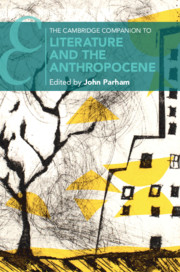Book contents
- The Cambridge Companion to Literature and the Anthropocene
- The Cambridge Companion to Literature and the Anthropocene
- Copyright page
- Contents
- Figures
- Contributors
- Acknowledgements
- Chronology
- Introduction
- Prologue Earth, Anthropocene, Literary Form
- Part I Anthropocene Forms
- Part II Anthropocene Themes
- Chapter 10 Catastrophe
- Chapter 11 Animals
- Chapter 12 Humans
- Chapter 13 Fossil Fuel
- Chapter 14 Warming
- Chapter 15 Ethics
- Chapter 16 Interspecies
- Chapter 17 Deep Time Visible
- Further Reading
- Index
- Cambridge Companions To …
Chapter 12 - Humans
from Part II - Anthropocene Themes
Published online by Cambridge University Press: 28 July 2021
- The Cambridge Companion to Literature and the Anthropocene
- The Cambridge Companion to Literature and the Anthropocene
- Copyright page
- Contents
- Figures
- Contributors
- Acknowledgements
- Chronology
- Introduction
- Prologue Earth, Anthropocene, Literary Form
- Part I Anthropocene Forms
- Part II Anthropocene Themes
- Chapter 10 Catastrophe
- Chapter 11 Animals
- Chapter 12 Humans
- Chapter 13 Fossil Fuel
- Chapter 14 Warming
- Chapter 15 Ethics
- Chapter 16 Interspecies
- Chapter 17 Deep Time Visible
- Further Reading
- Index
- Cambridge Companions To …
Summary
Humans are the first species to be conscious of their own transforming of the Earth system. This has entailed a paradoxical doubling of the human into anthropos (humanity as a blind geological force) and homo (humans as self-conscious, rational actors). Anthropocene stories pivot on anagnorisis – moments of self-recognition in which homo and anthropos become identified with each other. In most Anthropocene stories, humans attempt to resolve this paradox either by wielding geological power consciously or by renouncing mastery and receding into earthly forces. This chapter examines how Jeff Vandermeer’s Southern Reach trilogy seeks to keep the underlying paradox in suspension. Humans are confronted with an alien entity which embodies the geological force of anthropos, but they seek, nonetheless, to make sense of their fate. The novels thus reflect on a central task of literary writing in the Anthropocene: how to (re-)compose the human.
- Type
- Chapter
- Information
- The Cambridge Companion to Literature and the Anthropocene , pp. 211 - 225Publisher: Cambridge University PressPrint publication year: 2021
- 5
- Cited by

